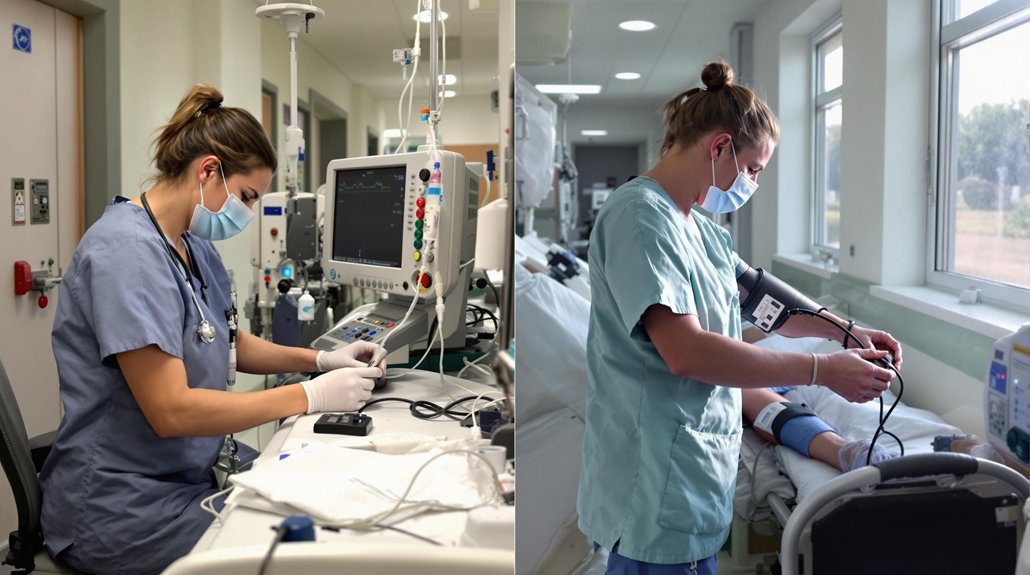CNAs qualify as skilled healthcare professionals based on their required specialized training and technical expertise. You’ll find they must complete state-approved programs lasting 4-12 weeks, master clinical skills like essential sign measurement, and pass rigorous competency exams. They perform complex patient care tasks requiring specialized knowledge of medical procedures, infection control, and emergency response. Understanding their classification as skilled workers reveals important implications for healthcare delivery and professional advancement.
The Educational Requirements and Training Process for CNAs
To become a Certified Nursing Assistant (CNA), you’ll need to complete a state-approved training program that typically takes 4-12 weeks. The CNA curriculum combines classroom instruction with hands-on clinical practice, preparing you to provide essential patient care under a nurse’s supervision.
CNA certification requires state-approved training combining classroom learning and hands-on practice to prepare for essential patient care duties.
During your training, you’ll learn crucial healthcare skills including taking vital signs, assisting with personal hygiene, and supporting mobility. The training duration varies by state, but you must complete at least 75 hours of instruction to meet federal requirements.
Many programs offer flexible scheduling options, including evening and weekend classes.
After completing your coursework, you’ll need to pass your state’s competency exam, which includes both written and practical components. Upon passing, you’ll receive your certification and can begin working as a CNA.
Medicaid home health care provides opportunities for certified CNAs to work directly with patients in their homes while maintaining community connections.
Core Responsibilities and Technical Skills in CNA Practice
While nursing assistants often work under supervision, they maintain significant responsibilities that require both technical expertise and interpersonal skills. Your core competencies will include taking crucial signs, assisting with personal hygiene, helping patients with mobility, and monitoring their condition for changes.
Among your essential tasks, you’ll need to master proper patient positioning, transfer techniques, and infection control protocols. You’ll regularly measure blood pressure, temperature, pulse, and respiration rates while documenting your observations accurately.
Supporting patients with daily activities like eating, dressing, and grooming requires both technical precision and compassionate care.
You’ll also serve as a crucial communication link between patients and the healthcare team, reporting significant changes or concerns promptly. These skills demonstrate that CNAs perform skilled work requiring specialized training and expertise.
The delivery of skilled health care involves both medical expertise and rehabilitation services to support patients recovering from surgery or managing chronic conditions in their homes.
Impact of CNA Classification on Healthcare Delivery
The classification of CNAs as skilled or unskilled workers markedly affects healthcare quality, staffing decisions, and patient outcomes.
When you understand how CNA roles are classified, you’ll see their direct impact on healthcare delivery through:
- Higher patient satisfaction rates when CNAs are recognized as skilled professionals
- Better staff retention when skill assessment reflects true competency levels
- Improved care coordination between CNAs and other healthcare team members
- More accurate staffing ratios based on actual care complexity
- Enhanced quality metrics when CNAs receive proper training and recognition
This classification influences everything from wage scales to care protocols.
If you’re working as a CNA, you’ll notice that facilities valuing CNAs as skilled practitioners typically deliver superior care outcomes.
Your role classification directly shapes the resources available for patient care and your ability to serve effectively.
Skilled CNAs often provide private duty nursing services that enable personalized, comprehensive care for patients with specialized needs.
Professional Standards and Certification Requirements
Since professional standards vary by state, CNAs must meet specific certification requirements to practice legally. You’ll need to complete an approved training program, pass a competency exam, and maintain your certification through continuing education.
The certification processes typically include both classroom instruction and hands-on clinical training.
You’ll learn essential skills like patient care techniques, infection control, and professional ethics. Most states require 75-120 hours of training before you can take the certification exam.
As a CNA, you must uphold strict standards of patient confidentiality, safety protocols, and professional conduct. Your commitment to these standards guarantees quality care and builds trust with patients and healthcare teams.
Regular renewal of your certification demonstrates your dedication to maintaining current skills and knowledge in the field.
Skilled nursing care encompasses both medical and daily living assistance to ensure comprehensive patient support in home health settings.
Comparing CNA Duties With Other Healthcare Roles
Compared to other healthcare professionals, CNAs perform distinct but essential duties that complement the work of nurses, physicians, and specialists. Your CNA job roles focus on direct patient care and support, while other medical staff handle more complex clinical procedures and decisions.
- You’ll assist registered nurses with basic medical tasks but won’t administer medications or make diagnostic decisions.
- Your role involves more hands-on patient care than administrative staff but less technical responsibility than licensed practitioners.
- You’ll face unique CNA workplace challenges like physical demands and emotional strain while supporting higher-level medical personnel.
- You’re often the primary connection between patients and other healthcare team members.
- Your duties concentrate on patient comfort and daily living activities, while doctors and nurses focus on medical treatment plans.
Similar to geriatric home care providers, you’ll assist with personal care assistance including bathing, grooming, and mobility support for patients who need help with daily activities.
Wage Structure and Labor Market Analysis
While CNA wages vary by region and facility type, entry-level positions typically start between $12-15 per hour, with experienced CNAs earning up to $20 per hour in some markets.
You’ll find that wage disparities exist between different healthcare settings, with hospitals often offering higher pay than nursing homes or assisted living facilities.
Labor market trends show increasing demand for CNAs, particularly in areas with aging populations.
Growing healthcare needs of aging populations drive steady increases in CNA job opportunities across multiple regions.
You’ll discover opportunities for wage growth through specialization, additional certifications, or advancement to leadership roles. Many facilities also offer benefits packages including health insurance, paid time off, and tuition reimbursement.
If you’re considering this career path, you can leverage the current healthcare staffing shortages to negotiate better compensation or seek employment in higher-paying markets and specialized care settings.
Evidence-Based Assessment of CNA Skill Levels
Beyond wage considerations, evaluating CNA skill levels requires concrete evidence and standardized evaluation methods. You’ll find that thorough skill assessment tools and competency evaluation programs help determine whether CNAs qualify as skilled healthcare workers.
- Clinical expertise demonstrated through hands-on patient care assessments
- Technical proficiency measured via simulation-based evaluations
- Communication abilities verified through patient interaction scenarios
- Documentation skills confirmed through medical record keeping tests
- Critical thinking capacity evaluated through emergency response drills
These evidence-based metrics show that CNAs perform complex tasks requiring specialized training.
When you undergo competency evaluation, you’re proving your ability to handle diverse healthcare responsibilities. The results consistently indicate that CNAs possess distinct technical and interpersonal abilities that extend beyond basic care, supporting their classification as skilled healthcare professionals.
Policy Implications for Healthcare Workforce Development
As policymakers examine healthcare workforce needs, the classification of CNAs as skilled workers carries significant implications for industry regulations and development initiatives.
You’ll find that recognizing CNAs as skilled professionals impacts funding allocations, training requirements, and career advancement opportunities.
Policy evaluation shows that investing in CNA professional development strengthens workforce sustainability and improves patient care outcomes.
When you support CNAs through enhanced training programs, competitive wages, and clear career pathways, you create a more stable healthcare environment.
These policies help reduce turnover, decrease training costs, and maintain consistent care standards.
To guarantee long-term success, you must advocate for policies that value CNAs’ expertise while providing resources for their continued growth and development in the healthcare field.
Conclusion
CNAs are like caring helpers who bridge the gap between basic assistance and skilled medical care. While they may not have advanced medical degrees, they receive special training and certifications that make them more than just regular caregivers. Think of them as gentle guides who learn the art of healthcare through classroom training and real-world practice – similar to how an artist develops their skills over time.
CNAs perform important duties with heart and dedication, making them valuable members of the healthcare team. They’re the ones who notice the little things, offer a gentle touch, and bring comfort to those who need it most. Their work combines practical skills with genuine compassion, creating a special kind of care that makes a real difference in people’s lives.
You don’t have to face healthcare challenges alone. Whether you’re looking for support for yourself or a family member, there are trained, compassionate CNAs ready to help. Your journey to better care starts with a single step.
If you or a loved one need help, don’t wait. Reach out to Focus Family Care today at (561) 693-1311 or email us at info@focusfamilycare.com.





